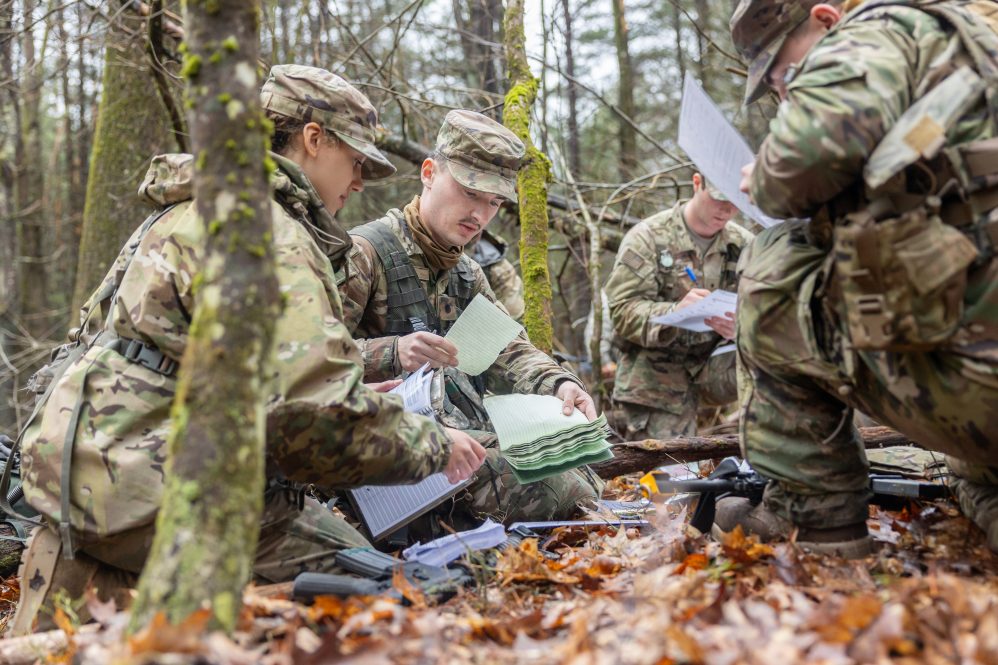Spring rain has flooded the once little creeks that crisscross the dense forest of Fort Devens in Massachusetts, which means that soon many of the 450 Army ROTC cadets on hand for spring field training exercises will be waist deep in mud.
They’re already wet though, waiting in the early April rain for the first activity of the four-day exercise to begin.
Dressed in a mix of camouflage uniforms – muddy greens and pixilated tans – this group of college juniors, known in ROTC lingo as MS3s, are warned that streams they may have been able to step across during earlier trainings might not be as easy to traverse today.

For certain, on a timed journey through thicket and trees in the land navigation portion of the weekend, each seeking out an individualized series of markers using paper maps, protractors, compasses, and the length of their stride to get from A to B, someone will land in the drink.
“Well, sometimes there’s a lake in the way,” says Geoffrey Takacs ’24 (ENG), an MS4 from the UConn Army ROTC program who’s grading the MS3 platoon leaders on their performance.
Spring FTX, that’s field training exercises, divides these 450 cadets from UConn, Worcester Polytechnic Institute, Siena College, and the universities of Maine, Massachusetts, New Hampshire, and Vermont into two groups.
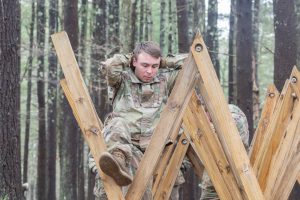
Basic camp is for freshmen and sophomores, MS1s and MS2s, who sleep in communal tents and on cots, while the juniors in advanced camp rough it in the outdoors three nights without hot meals, running water, and the other comforts of home.
MS4s from each school – these are the graduating seniors who’ve gone through all the levels of their military science training, that’s the MS part – both keep the weekend of obstacle courses, land navigation, and STX lanes – situational tactical exercises – moving and serve as graders for the MS3s who are preparing for Cadet Summer Training.
For them, and in lay terms, this is like taking the PSAT to get ready for the SAT this summer.
“Trainings like this are important because the cadets are learning skills that are very new to them. A lot of what they’re doing is not intuitive, so they learn these military tasks that eventually help them become good leaders, or at least someone who understands leadership,” says Lt. Col. Seth M. Allen, who’s at the top of the UConn Army ROTC chain of command.
And activities like land navigation, he says, oftentimes humble even the straight A student.
‘How many UConn students can say they’ve dropped out of a helicopter?’
Takacs, a computer science major, says he long ago felt the proverbial urge to serve, after watching family members work in various government capacities; his dad is in the FBI. In his hometown of Monroe, Takacs became a volunteer firefighter in high school and when he was a senior successfully earned the ROTC National Scholarship to come to UConn.
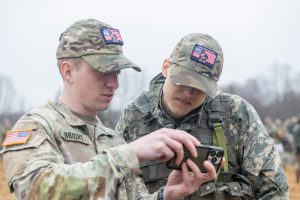
That pays tuition and fees, while additional scholarships cover room and board. In exchange, he owes four years to the U.S. Army, and will start his active-duty time in the infantry this summer.
“The training we get in ROTC is second to none, especially when it comes to the leadership activities that we do,” Takacs says. “We’re in the UConn Forest once a week, getting that hands-on experience through mud, rain, and snow. We’re pushed to such great lengths that I don’t think traditional college students are. I mean, how many UConn students can say they’ve dropped out of a helicopter?”
Olivia Bowes ’24 (CLAS) can.
Jackson Bright ’24 (CLAS) can.
“You don’t realize how heavy 90 feet of rope dangling below you is going to be,” Bowes, a molecular and cell biology major, says. “Then you also have the down pressure of the aircraft.”
“The trick is to try to pause a little bit up there,” Bright adds. “I had a lieutenant tell me to try to stay up there an extra half second so you can look around because the view is unlike anything you’ve ever seen before.”
Bowes and Bright also are MS4s from UConn, joined by Eden Hyatt ’24 (CLAS) and 14 others in the Storrs program that has about 70 cadets in total.
Bright is majoring in economics and Spanish, the latter of which he hopes will help him as he heads into active duty in intelligence. He came to UConn and ROTC for financial reasons, much the same as Bowes and the others. The Rhode Island native was a freshman at a private university that recruited him to play baseball when he faced the sudden realization of paying for it all another three years.
He says during the pandemic he was working at a deli near school and in the university parking lot, the Connecticut Army National Guard had set up a COVID testing station. When the soldiers would come in for a sandwich, he’d pepper them with questions about what benefits the Guard offered.
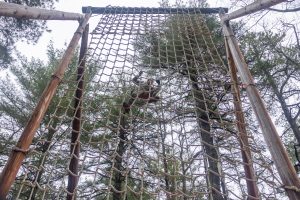
That’s when he bit and met with a recruiter about joining, going to basic training, transferring to UConn, and becoming an ROTC student. It means he has drill weekends with the National Guard once a month, which gives him some spending money with tuition paid for by the military and a job as an RA paying for housing and meals.
“There are very few people who aren’t interested in the things I’ve done. I mean, rappelling out of a helicopter, that’s just a good conversation starter,” he says.
“We joke that they sent me to space camp,” Takacs adds. “It was actually the Army Space Cadre Basic Course where I got to learn about missiles and satellites. They looked at my major and told me the course would help me in a civilian career even if I don’t stay in the Army. It’s a certification that makes me so much more competitive than my peers.”
Bowes says her resume already includes a long list of opportunities, awards, certifications, and qualifications – never mind her citizenship.
She was born and raised in Belfast, Ireland, before moving to West Hartford the last two years of high school. As a track athlete, she says she applied to three colleges, including UConn, and was about to settle on a private school when she had an ah-ha moment: What happens if she loses her track scholarship? How would she pay for it all?
“Then I did the Husky-for-a-Day program and my Husky said to me, ‘You can make a big school feel small, but you can’t make a small school feel big.’ As soon as she said that, and I remember it clearly, I was like, she’s totally right,” Bowes says.
She came to Storrs in 2019 before the pandemic and realized quickly she needed to find a way to pay for the rest of her time here. With an eventual goal of becoming a reproductive endocrinologist to help people with infertility, she knew there would be a lot more school ahead.
Bowes says she saw National Guard posters, the promise of 100% free tuition, and much the same way Bright bit, she did too, joining as a combat medic, which gained her citizenship and an EMT certification, along with weekend drills and the extra paycheck that comes along.
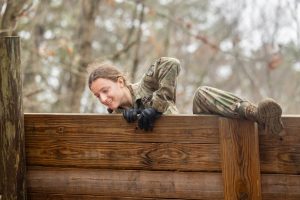
UConn Army ROTC was a no-brainer decision once she returned to campus.
“I was a sophomore and brand new to the program, I had no clue what I was doing,” she says. “I felt out of my depth every single Friday lab in the UConn Forest. People seemed like they knew what they were doing, but I was just running around with my 35-pound ruck waiting for it to be over. I was like, ‘I have no idea what’s happening.’ But now, I can run all of it, not on my own, but I understand all of it.”
As an RA to pay for housing and meals, Bowes now will metaphorically pay for her undergraduate degree with a six-year commitment to the National Guard upon graduation.
Battle buddies and 5 a.m. PT
Hyatt, a psychology major from Windsor, works the basic camp registration tent at Spring FTX. As cadets from each school arrive – on a staggered schedule to avoid an intake backup – she crosses off their names, gives them a cot assignment, and makes sure they have an MRE in hand.
That’s a Meal Ready to Eat, or essentially a tan pouch filled with smaller pouches of food prepared for a long shelf life. Pork sausage patty with maple flavoring. Beef stew. Cheese tortellini in tomato sauce. Beef patty with jalapeno and pepperjack.
Each MRE is supposed to contain coffee grounds with instructions on how to brew a cup, in a provided bag, filled to the line with water, shaken, flavored with powdered cream, and warmed in the sun – or not on this cold, rainy April day.
Two of Hyatt’s grandparents were in the military and both her parents are UConn alums, so when it came time for her head to college neither UConn nor ROTC were a surprise. She joined the UConn Air Force ROTC first only to leave soon after joining because of a scheduling conflict.
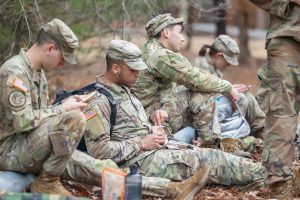
“But I knew I needed to pay for college, so during winter break of my sophomore year I talked with the Air Force lieutenant colonel who asked if I ever considered the Army instead,” she says. “That’s when I decided to join the Army National Guard to pay for school.”
She’s assigned to an aviation unit near Bradley International Airport in Windsor Locks and tries to get on flights every drill weekend – although it hasn’t yet panned out. Since she commutes to Storrs, her tuition waiver pays for school and she has spending money.
“ROTC has given me built in friends. They’re battle buddies, which is literally what we call them, just a bunch of people who at any given moment if I said, ‘Hey, I need some help,’ or ‘Hey, I just want to go out,’ I could call at least one of them and they would show up,” Hyatt says. “It’s this kind of brotherhood, sisterhood. You can get that elsewhere in college, but it’s not as automatic or as easy.”
Like Takacs and Bright, Hyatt also is headed to active duty upon graduation; she as a quartermaster, basically a logistics coordinator for everything from ammunition to food.
One unifier among all of them is a 5 a.m. wakeup most days to do PT, that’s physical training, around campus. At first, Hyatt says, her friends outside ROTC would grumble about how exercising at that hour is crazy.
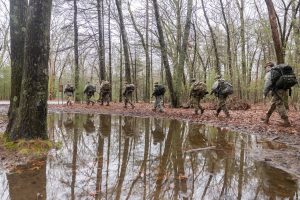
“I was like, ‘Yes, but that’s life,’” she says. “And then this year, those same people remarked to me that the Rec Center is actually open and empty at 6 a.m. and now they’re getting up early too. It’s not like everybody’s suddenly doing everything I’m doing, but a couple of my friends have become 1. Desensitized to the conversations I have, and 2. Have picked up some habits.”
Still, none of them can say they had tracer rounds fired above their heads, while they low-crawled in all their gear, think flak vest and helmet, through the sand, over barbed wire and around rocks while a drill sergeant in the rear yelled to keep the pace.
Hyatt did that during NIC – that is, the Night Infiltration Course she completed during basic camp, which she did instead of basic training her junior year. NIC, she says, absolved her from taking a turn in the gas chamber.
“And you’re thinking to yourself, ‘What have I signed up for?’ I’ve definitely had that thought a few times,” Bowes chimes in. “You’ll be out there knee-deep in mud, completely drenched, your face camo dripping off, and you’re just standing there thinking, ‘How did I get here?’”
She continues, “But you can throw a situation at me now and I can assess a million different possible outcomes and decide faster than any of my peers outside of ROTC because they’re not typically put in situations where they have to make a decision fast and it has to be the right decision. Being able to determine what is going to be the best-case scenario for everyone, or most everyone, is a skill that you gain in ROTC and, for me, is so valuable in the medical field.”
UConn Army ROTC: 26th in size out of 274
Land navigation at Fort Devens is just another part of getting to know oneself, another step in the journey to leadership and maturity.
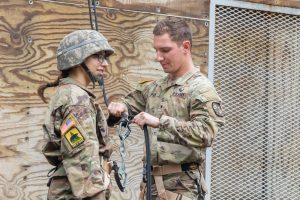
“In assessing the MS3s, we use various tactics to assess their leadership capabilities. It sure helps if you can make the best tactical decisions, but if you make a wrong decision in ROTC, yet can justify it and there’s a thought process, that’s leadership. That’s what we’re looking for. It’s when you start panicking that we can see you didn’t prepare and there’s a failure of leadership,” Takacs says.
Upon graduation and commissioning in May, Bowes, Bright, Hyatt, and Takacs, along with 14 other graduating MS4s, will enter the military world as second lieutenants. It’s something they say is exciting. Bittersweet. Sad.
“For all of us, it’s graduation but it’s not the end of education. Bowes is going to be a doctor. Hyatt wants to be a psychologist. Bright talks about law school. I’m going to Ranger School. We’re all here to continually learn, adapt, and grow,” Takacs says.
Allen explains that everything they’ve done at UConn and in Army ROTC has been used to evaluate them, hone their talents, give them direction, and eventually send them on their way. The process of applying for, interviewing with, and being accepted to the branch, or military career, they want to pursue has been a big part of the last several years.
“All of them did so well over their time in ROTC that they all essentially got their top choice of what they’re going to do in the future. There’s no one truly upset or disappointed in what job they’re going to do in the Army,” he says.
As for the future of UConn’s program – ranked in size at No. 26 out of 274 in the country – Allen, who has one more year in his post at UConn, says he wants simply to keep turning out well-rounded, leadership-ready cadets.
“The better they do, the more opportunities come our way,” he says, explaining that a relationship with the Connecticut Army National Guard meant the UConn cadets got to ride in a Chinook helicopter at the Fall FTX. “You have freshmen who came in and they had only been here for two months and, suddenly, they’re sitting in the back of a Chinook. They probably never imagined that would ever happen, much less two months into their time.”
He also says the program needs to continue to educate civilians – that is, high school guidance counselors, teachers, and parents – about what it is and isn’t. ROTC does not deploy students overseas while they’re in college, he stresses, they’re students first.
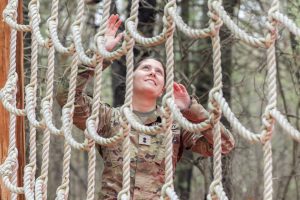
And when they graduate, they have the choice of entering the Army National Guard, Army Reserves, or active duty – each with different levels of commitment.
By that time, with the progressive training they’ve gotten through things like Friday labs in the UConn Forest and Spring FTX, they’re ready.
“I was someone who maybe never would have put myself out there and try to reach for something this soon,” Bright says. “For a lot of people, college is going to class and having a social life, and while you can still do that, ROTC forces you to stay disciplined and it gives you opportunities to achieve what you really want to achieve. It’s teaching me how to manage my time well and how to evaluate myself, to know what I can and can’t handle.”
